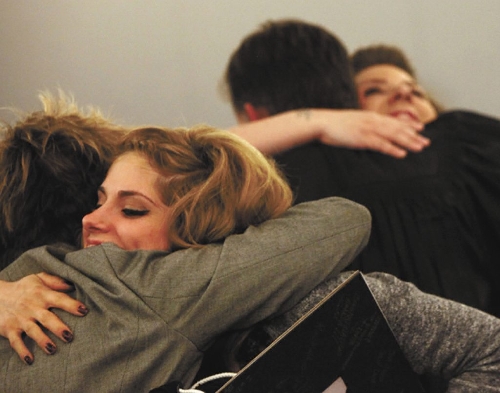Graduates of drug treatment program face life on their own
EDITOR'S NOTE: Part of an occasional series looking at the Youth Offender Court in Las Vegas.
This is a place where offenders asked to be jailed.
Where shackled defendants walk into the courtroom smiling.
Where families hug the judge who handcuffed their sons and daughters before putting them behind bars next to hardened criminals.
For 23-year-old Amanda Schaum, Youth Offender Court equipped her with the necessary skills to kick her prescription drug habit and become one of the specialty drug court program's first graduates.
Schaum said she wants to put those days of Xanax, Valium, marijuana and alcohol behind her.
She had been using the drugs since she was 14 years old. She is now 13 months sober after being arrested for two DUIs in 2009.
"I wanted to have a better life," Schaum said.
"It came to a point in my life where I had to choose how do I want to get sober. Do I want to spend years of my life behind bars trying to get sober? Or do I want to try on my own with the help of the court and the resources it's given me?"
The affectionately nicknamed "YO Court" is a yearlong drug treatment program in Las Vegas Municipal Court that requires defendants and their families to participate in the recovery process.
The offenders are there for other crimes, such as petty larceny and failing to pay traffic fines.
Judge Cedric Kerns created the program almost one year ago. He held a graduation ceremony on March 3 for Schaum and former defendant Sharlene DeZolt. Their success is the pinnacle moment that all of Kerns' defendants are trying to achieve.
Drug addicts are expected to relapse five to seven times while attempting recovery, according to the national average. About half of the 30 or so offenders have relapsed during the program.
Both graduates were addressed by Nevada Supreme Court Justice Nancy Saitta, who told them, "The success you two show and hope you provide is beyond anything I've been a part of. It's an honor to be a part of a system that works. We don't get to say that very often."
Saitta praised Kerns for stepping in and saving the lives of his defendants.
"Very few of us take the time to give of ourselves," she said.
Schaum, a hairdresser, struggled with her sobriety before YO Court, bouncing in and out of rehab and other counseling programs for the past six years. Drug and alcohol addiction runs in her family. Her father is celebrating 10 years sober.
"In the beginning I was an emotional wreck," Schaum said. "It's hard when you've been numbing your feelings and emotions for so long, and then to feel everything, that's hard to take. It's overwhelming, but having somebody to talk about it with is great. Having support like family is the most important thing. My relationships have changed with my family. I don't have those friends anymore. I'm closer with my family. I've had a personal transformation."
Eric Schaum stood in front of Kerns to thank the man who helped save his daughter's life.
"I really thought I would have to bury my daughter," he said, fighting back tears. "I really thought she'd end up in the morgue."
Councilman Steve Wolfson attended the emotional ceremony in Kerns' sixth-floor courtroom at the Regional Justice Center. It was standing room only as 80 family members, offenders, lawyers, community partners and media crammed into the tiny room to watch.
"I've never seen such a remarkable program," Wolfson said. "The 'Thank you Judge Kerns for putting me in jail' is such a remarkable reflection of this program. He is unlike any other judge. This man is not paid to do this, but he wants to deliver a product to the community through these graduates."
Wolfson vowed he would help the court find money to keep going. Program funding comes from state grants , an anonymous donor, discounted class prices and from the offenders themselves, who are required to work.
The court has struggled to find sustainable funding with its $60,000 budget eaten up by drug testing costs for the 30 or so offenders, Kerns said.
The judge showed a video made by the court to reflect on the year's first program.
Natasha Bedingfield's song "Unwritten" played in the background. Its refrain -- "Live your life with arms wide open/Today is where your book begins/The rest is still unwritten" -- seems to speak to what drug addicts go through in their fight for sobriety and a second chance at life.
Among gifts for the former defendants were show tickets and picture frames signed by other offenders. Taped to the back were envelopes with their mug shots. "So you remember where you were and how far you've come," Kerns said.
The two graduates also were given recovery journals to continue documenting their sobriety for the next five years.
Kerns hugged them before dismissing their cases. Applause echoed in the courtroom as offenders and their families rushed to congratulate the graduates.
Schaum said the uncertainty of her future outside of YO Court has her nervous. The threat of jail time hanging over her head for not completing the program no longer exists.
"I'm going to be on my own now," Schaum said. "I'm going to continue going to my meetings that I've set into a routine over the past year. I'm going to continue doing my hairdressing. My business has improved ever since I've been sober. Imagine that."
Contact Downtown and North Las Vegas View reporter Kristi Jourdan at kjourdan@viewnews.com or 383-0492.






















